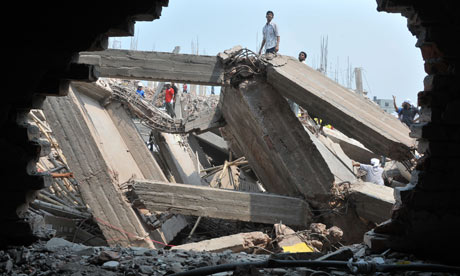Savar,
Apr 25 - The abject scene of death and destruction in Savar where
the ill-constructed Rana Plaza collapsed Wednesday morning was
interspersed with a string of small miracles on Thursday – a testament
to the sheer resilience of human life in the face of unfathomable
tragedy.
As UNB updated its coverage of the
somewhat fitful but enthusiastic rescue efforts around 1:45 pm today
(Thursday), the official death toll rose to 188, roughly 33 hours on
from the moment the eight-storey building had collapsed. The final death
toll is likely to be much higher.
The bodies were laid out on the grounds of the nearby Adhar Chandra School and College.
The ill-fated building accommodated at least four garment factories and some 300 shops with nearly 4,000 workers.
So
far 147 bodies have already been handed over to the deceased’s family
members after proper identification with primary financial assistance of
Tk 20,000 for each body from the district office to complete the
funeral activities.
Jatiya Sangsad Chief Whip
Abdus Shahid, State Minister for Liberation War Affairs Capt (rtd) AB
Tajul Islam, local MP Talukder Towhid Jang Murad and GOC 9 Infantry
Division of Savar Major General Chowdhury Hasan Sarwardy, Bir Bikram,
visited the spot in the morning.
More than a
few souls whispered untold numbers had been whisked away in the
darkness, but ever since evening fell on Wednesday the focus had shifted
very much onto the living.
Rescue teams
formed out of the security and emergency services, the young doctors of
the Ganashasthya Kendra, as well as civilians worked round the clock to
converge on any openings they could find in the wave of debris, through
which they could try and meet some cry for life, and hopefully pull out
some living human beings.
Invariably a body,
alive or dead, stood in the way. Late into Wednesday afternoon a man
gave up his leg to escape what he described as a living hell. A senior
doctor performed the surgery, but after midnight, the young doctors on
duty were more apprehensive about taking such action when called upon by
the army on at least two occasions.
One of
the Ganashasthya Kendra doctors on duty told UNB as of 2am Thursday they
had been called out to cut off a limb on 3-4 occasions, all of which
they refused. But rescue services were frustrated by their failures to
get past bodies obstructing the way to more living human beings beyond.
One
body blocked an opening beyond which some 70 people were presumed alive
on the south side of the building. Another blocked the path to a
further 100 others. Most of the information was passed on by those stuck
in these cursed openings, communicating whatever they could gather
about their surroundings in that state to rescuers.
In
other places, sheer concrete stood in the way, which rescue services
worked to bring down. One group of the fire service was stuck on the
verge of rescuing a hundred people apparently, as soon as they were able
to drill through to bring down a concrete wall measuring hardly 6 ft by
6 ft on the northern side.
Work is slow, and
needs to be, because boring a hole down the wrong line can end up
triggering some other collapse - yes, there is likely to be more
movement towards the earth as the entire building gives in.
Possibly,
the east of the building could be said to have suffered the worst
damage, as the shape of the wreck gives a whole new meaning to the
phrase `fallen on its backside’.
You get used
to the stench of dead, dying, and suffocating bodies pretty quickly, but
even then, peering into the darkness here was disturbing. No real
rescue effort could be spotted here, and people only talked about the
300-400 bodies that lay dead in a chunk of the top floors that lay
splattered in a heap here.
Except in one
corner of the building, where a late breakthrough witnessed a slew of
bodies being rescued from the rubble, at least six in quick succession.
They hoped to get inside and save some 60-70 more. It served to send a
wave of encouragement coursing through the broken concrete from one end
to another - a reminder of the life that once populated it and that
which still haunts it.
Source : unb


